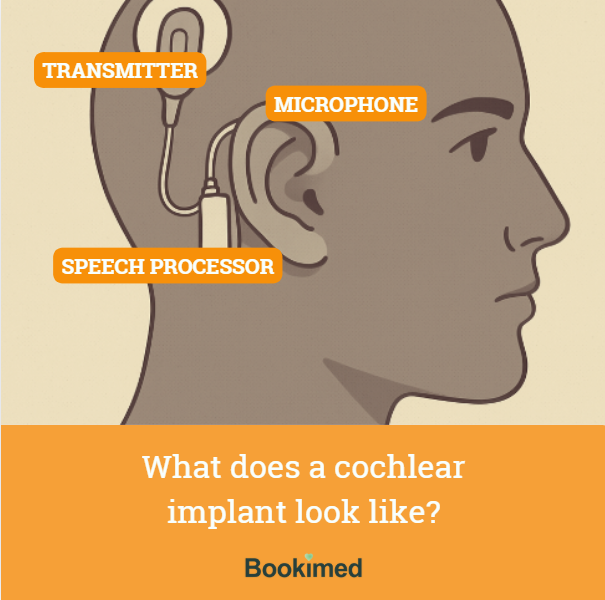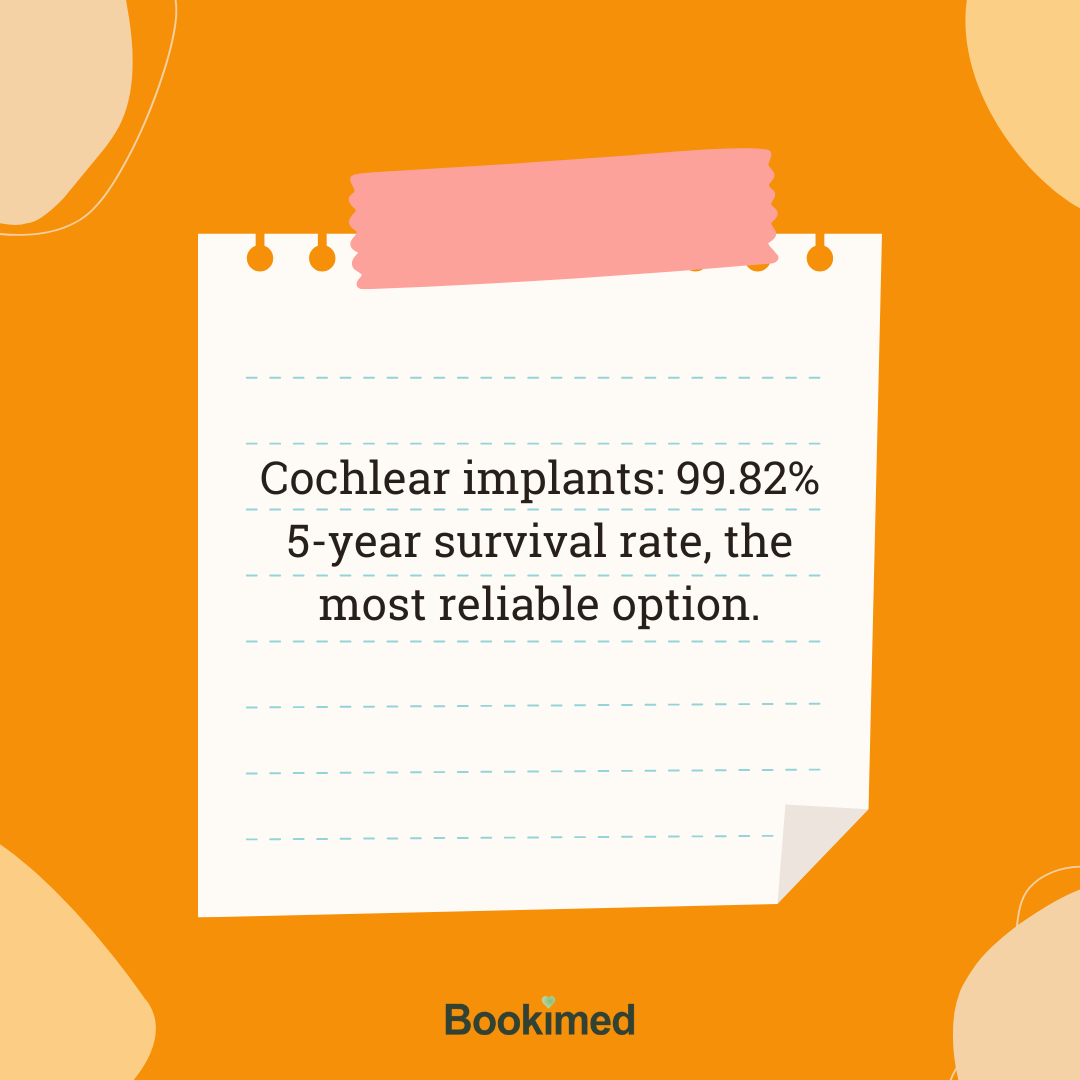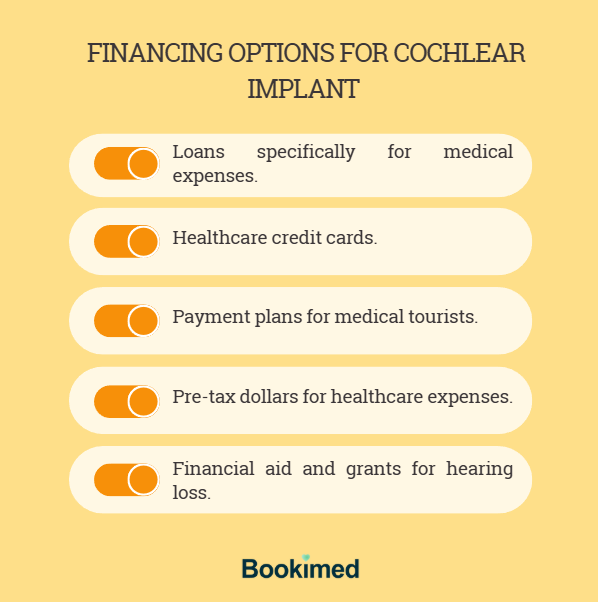Cochlear implants are becoming an essential solution as the World Health Organization predicts that by 2050, nearly 2.5 billion people will have some level of hearing loss. As healthcare costs soar, many are turning to medical tourism for affordable care without sacrificing quality. Countries like Turkey and Mexico offer cochlear implant surgeries for as low as $10,000, with facilities accredited by the Joint Commission International (JCI) and compliant with International Organization for Standardization (ISO) standards. This article by Bookimed explores global destinations where patients can receive high-quality cochlear implants at a fraction of the cost found in the United States.
Table of Contents:
- What is a Cochlear Implant?
- Types of Cochlear Implants Patients Choose?
- Cochlear Implant Price Across the World
- What's Included in Cochlear Implant Surgery Packages
- Cochlear Implants vs. Hearing Aids
- Hearing Implant Surgery: What to Expect
- Are Cochlear Implants Covered By Insurance?
- Financing Options for Cochlear Implant Surgery
- FAQs
Key Takeaways: Cochlear Implant Surgery Abroad
💸 Potential savings. Patients can save up to 85% compared to U.S. prices of $60,000 to $100,000.
Turkey: $14,000 - $22,000
Mexico: $10,000 - $20,000
Thailand: $10,000 - $15,000
Germany: $35,000 - $50,000
Spain: $30,000 - $50,000
Brazil: $15,000 - $30,000
🏥 Quality assurance. High standards maintained with JCI and ISO accreditations.
✈️ Comprehensive service packages typically include surgery, hospital stay, transport, and often accommodation.
💳 Financing and insurance. Patients should verify whether their health insurance provides coverage abroad or consider alternative financing options.
What is a Cochlear Implant?
A cochlear implant is a medical device that provides a sense of sound to people who are profoundly deaf or severely hard of hearing. Unlike other devices that enhance hearing, cochlear implants bypass the damaged parts of the ear. It directly stimulates the auditory nerve, including the cochlear nerve, sending signals to the brain that are recognized as sound.
How does a cochlear implant work?
📩 Think of your ear as a busy mailroom. Usually, sounds come in like letters that must be delivered to your brain. But if the mailroom is broken, the letters can’t get through. A cochlear implant works like a super-fast mail carrier. It picks up the sounds outside, turns them into special messages, and zooms them straight to your brain, bypassing the broken parts of the ear.
What are the essential cochlear implant parts?
As mentioned before, a cochlear implant converts sounds into electrical signals that the auditory nerve can send to the brain, which recognizes them as sound. It is possible thanks to the following components:
External sound processor. This part sits behind your ear and acts like the mailroom manager, gathering sounds from around you.
➤ In technical terms, it captures ambient sounds and converts them into digital signals.
Transmitter. Think of this as the delivery truck that packs up the sounds and sends them on their way.
➤ It wirelessly sends these digital signals to the implant inside your body.
Cochlear implant device. Hidden under the skin, this is like the central post office, where sounds are turned into special messages.
➤ This device directly converts the signals into electrical impulses.
Electrode array. These are the speedy mail carriers who deliver these messages straight to your brain.
➤ The electrodes stimulate the auditory nerve, also known as the hearing nerve, allowing the brain to perceive these impulses as sound.
✅ Research shows a 94.4% success rate for cochlear implant surgeries over 10 years, with devices working 96.0% of the time.

Let's take a look at the benefits of a cochlear implant.
✅ With a cochlear implant, patients can:
Hear their friends and family better, even if they are whispering.
Listen to different sounds, whether a dog barking, music playing, or a phone ringing.
Feel more a part of the world around you because they can hear more of the wonderful sounds it makes.
What does a cochlear implant look like?

💚 Find out more about the cochlear ear implant experience by reading real Bookimed patients' testimonials.

Types of Cochlear Implants Patients Choose?
Patients can choose from various types tailored to their specific hearing needs and lifestyle:
Single-unit processors.
These devices integrate all components into one behind-the-ear unit, making them easy to manage.
✔️ Particularly suitable for adults who prefer simplicity.
Behind-the-ear (BTE) processors with separate coil
This setup includes a sound processor that rests behind the ear and a coil that attaches magnetically.
✔️ Ideal for active individuals seeking a comfortable, discreet, and easily adjustable cochlear implant.
Body-worn processors
These have a sound processor that can be clipped onto clothing and connected by a wire to a transmitter coil on the head,
✔️ Often recommended for young children or individuals with handling difficulties.
Hybrid cochlear implants
These implants combine the benefits of cochlear implant technology with conventional hearing aid features.
✔️ Designed for patients with residual low-frequency hearing but significant high-frequency loss.
These hybrid devices are among the approved cochlear implants that meet regulatory standards for safety and efficacy.
✅ A 5-year survival rate of 99.82% makes Cochlear implants from Cochlear the most reliable, with higher failure rates reported for Advanced Bionics and MED-EL.

These offers might interested you:
Cochlear Implant Price Across the World

💵 When considering cochlear implant surgery, it's important to examine the global differences in the cost of cochlear implants. This can lead to substantial savings and influence the choice of destination for medical tourism.
For example, in the United States, the cochlear implant price ranges from $60,000 to $100,000. By going for surgery in Thailand, where the cochlear implant cost ranges from $6,000 to $15,000, patients can save up to 85% or more. This represents a saving of nearly 6 to 10 times the cost incurred in the U.S.
Similarly, compared to the United Kingdom where the cochlear implant price is between $37,500 and $50,000, choosing countries like Mexico with a cost range of $10,000 to $20,000 can lead to savings of about 50% to 70%.
👉Each country's cochlear implant price list reflects different healthcare systems and market dynamics.
| Country | Cost Range (USD) |
|---|---|
| Azerbaijan | $10,000 - $20,000 |
| Brazil | $15,000 - $30,000 |
| Dominican Republic | $15,000 - $25,000 |
| Germany | $35,000 - $50,000 |
| Greece | $25,000 - $40,000 |
| Israel | $30,000 - $50,000 |
| Italy | $30,000 - $45,000 |
| Mexico | $10,000 - $20,000 |
| Poland | $15,000 - $30,000 |
| Republic of Korea | $20,000 - $40,000 |
| Spain | $30,000 - $50,000 |
| Thailand | $10,000 - $15,000 |
| Turkey | $14,000 - $22,000 |
| United Arab Emirates | $55,000 - $75,000 |
| United States | $60,000 - $100,000 |
| United Kingdom | $37,500 - $50,000 |
What's Included in Cochlear Implant Surgery Packages
Medical tourism packages include comprehensive services to ensure a comfortable experience. Here's a brief overview of what is typically included:
Medical procedures and hospitalization
Cochlear implant placement and necessary consultations with specialists such as otolaryngologists and surgeons.
Preoperative and postoperative care, including blood tests, MRIs, CT scans, and necessary medications.
Hospital stays vary, with some packages offering up to 4 days.
Transportation and accommodation
Transfers between the airport, hotel, and clinic are commonly included, with some packages offering VIP transport services for enhanced comfort.
The average duration of a hotel stay included in the package typically ranges from 2 to 21 days, depending on recovery.
Support services
24/7 assistance throughout the medical journey from Bookimed.
Personal medical coordinators and interpreters are available to help navigate the process.
Costs and additional information:
❗Additional costs not included typically encompass airfare and any non-medical personal expenses.
Cochlear Implants vs. Hearing Aids
Cochlear implant alternatives, like hearing aids, offer additional options for those with hearing challenges. Both devices aim to improve hearing but are suited for different types of hearing loss, which come with distinct features and limitations.
| Parameter | Cochlear implant | Hearing aid |
|---|---|---|
| Suitability | Severe to profound sensorineural hearing loss | Mild to moderate hearing loss |
| Function | Bypasses damaged portions of the ear to directly stimulate the auditory nerve | Amplifies sounds so they can be detected by damaged ears |
| Visibility | Usually more noticeable due to external components | Less visible, some models fit entirely within the ear canal |
| Performance in noise | Often provides better clarity in noisy environments due to direct nerve stimulation | Can struggle in loud environments, depending on the technology used |
| Battery life | Requires regular battery changes or recharging, depending on the model | Typically longer battery life, especially in smaller, less power-intensive models |
| Cost | Generally more expensive due to surgery and device costs | Less costly compared to cochlear implants |
| Surgical requirement | Requires surgery to implant | No surgery needed, non-invasive |
| Longevity | Designed to last many years, though may require surgery to upgrade or replace parts | May need replacement every few years due to wear and updates in technology |
Hearing Implant Surgery: What to Expect
Embarking on a cochlear implant operation can be both hopeful and daunting. This guide outlines each step, ensuring patients approach the process with confidence.
1️⃣ Before the surgery
You'll undergo medical evaluations, hearing tests, and imaging such as MRI or CT scans. Discussions with your surgeon will address the procedure's benefits and limitations.
2️⃣ During the cochlear implant treatment
The surgery is performed under general anesthesia. It starts with a small incision behind the ear. The surgeon then places the implant and inserts the electrode array into the cochlea. The process generally lasts between 1 to 3 hours.
3️⃣ After the surgery
After cochlear implant surgery you may experience discomfort and dizziness, which typically resolve quickly. Patients often go home the same day or stay overnight.
❕Activation and adjustments are made about a month later, followed by essential auditory rehabilitation.
Lifestyle adjustments
Regular maintenance is crucial for the implant's external components.
📌 Daily clean and inspect the processor and cables.
📌 Use a waterproof cover during water-related activities.
📌 Wear a protective helmet for risky activities.
📌 Schedule regular tuning and updates with your audiologist.
📌 Avoid excessive noise or adjust implant settings for loud environments.
📌 Charge batteries nightly or keep spares handy.
📌 Learn to adjust device settings for various environments.
Are Cochlear Implants Covered By Insurance?
When considering cochlear implantation through medical tourism, determine if your insurance plan covers international procedures. Coverage often includes surgery costs, the device, and follow-up care.
❕However, policies vary widely, so confirming specific benefits and limitations with the insurer is essential.
While some hearing insurance plans cover the cost of the cochlear implant device and the surgery, there may be varying degrees of coverage for pre-surgery evaluations, post-operative rehabilitation, and device maintenance.
👉When exploring hearing insurance plans, check with major U.S. insurers like Blue Cross Blue Shield, UnitedHealthcare, and Aetna, as policies vary. For international procedures, ensure your plan covers treatments abroad.
✅ If your insurance doesn't cover treatment abroad, cochlear implant device can still be cost-effective. For instance, while the procedure costs between $60,000 and $$100,000 in the U.S., it might only cost $10,000 to $15,000 in countries renowned for medical tourism like Thailand.
💡Use resources like Patients Beyond Borders and the Medical Tourism Association to explore options and understand potential out-of-pocket expenses.
Financing Options for Cochlear Implant Surgery

Each option offers unique benefits and requirements, which can help manage the costs associated with cochlear implant surgery.
| Option | Details |
|---|---|
| 🏦 Medical loans | Loans specifically for medical expenses: NerdWallet Medical Loans, SoFi Personal Loans |
| 💳 Healthcare credit cards | Special financing options for healthcare: CareCredit, Wells Fargo Health Advantage |
| 💵 Payment plans | Available at many clinics: Especially common in countries like Thailand and Turkey for medical tourists. |
| 🌐 HSAs/Flexible spending accounts | Use pre-tax dollars for healthcare expenses: Most U.S. employers offer these accounts. |
| 🎗 Charitable support | Financial aid and grants for hearing loss: Hearing Loss Association of America, Starkey Hearing Foundation |
FAQs
Can you swim with a cochlear implant?
Yes, you can swim with a cochlear implant, but using a waterproof cover or case specifically designed for your implant model is crucial to protect it from water damage.
Is there cochlear implant jewelry available to personalize my device?
Yes, cochlear implant jewelry is available to help personalize your cochlear implant. These decorative items can clip onto the external part of your implant, allowing you to express your style while maintaining the functionality of your device.
How does cochlear implant technology improve hearing for people with severe hearing loss?
In order to restore normal hearing, cochlear implants convert sound into electrical signals sent directly to the brain, enhancing speech understanding and environmental interaction.
How much does a cochlear implant cost?
Cochlear implants costf rom $30,000 to $100,000 in the U.S. and $10,000 to $50,000 in medical tourism destinations, depending on location and included services.
Image sources:
Banners designed by Freepik
All medical content on this page is prepared by authors with specialized medical education and reviewed by certified physicians in the relevant field. Medical review by Fahad Mawlood, Medical Editor & Data Scientist.
Last updated: September 22, 2025.
- Statistics: Figures are based on Bookimed’s internal database February 2026, which includes analysis of 12,450 patient requests across accredited clinics in .
- Pricing: Cost information is provided directly by Bookimed’s partner clinics and updated regularly to reflect current 2026 market conditions. Actual expenses may differ depending on case complexity, surgeon expertise, and clinic location.
- Clinical Data: Treatment outcomes and patient satisfaction figures are collected from Bookimed’s verified clinic database and supported by data from peer-reviewed medical sources such as PubMed, The Lancet, JAMA, and NEJM (2023–2026).
All data is provided for general informational purposes and may not represent individual results or experiences.
- Deafness and hearing loss. World Health Organization (WHO). URL: https://www.who.int/news-room/fact-sheets/detail/deafness-and-hearing-loss (date of access: 16.01.2025).
- Evaluating Reasons for Revision Surgery and Device Failure Rates in Patients Who Underwent Cochlear Implantation Surgery / S. Y. Kim et al. JAMA Otolaryngology–Head & Neck Surgery. 2020. Vol. 146, no. 5. P. 414. URL: https://doi.org/10.1001/jamaoto.2020.0030 (date of access: 16.01.2025).
- Cochlear™ remains #1 in implant reliability according to latest report. Cochlear Implants. URL: https://pronews.cochlear.com/cochlear-remains-1-in-implant-reliability-according-to-latest-report/ (date of access: 16.01.2025).


